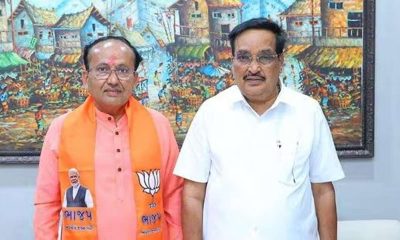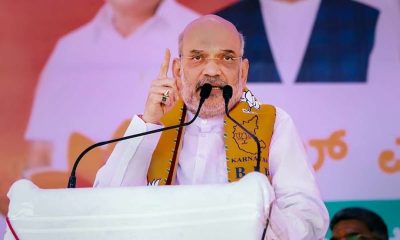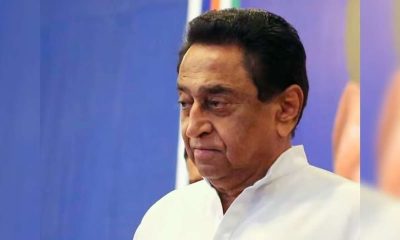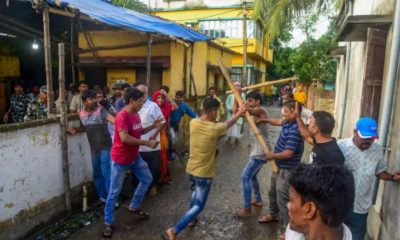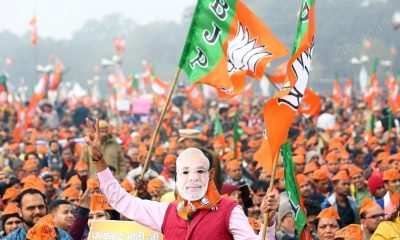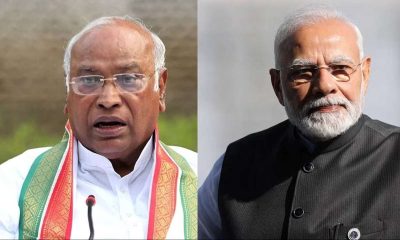India News
Meaning of Latest Turn In Kashmir Lies Outside The State
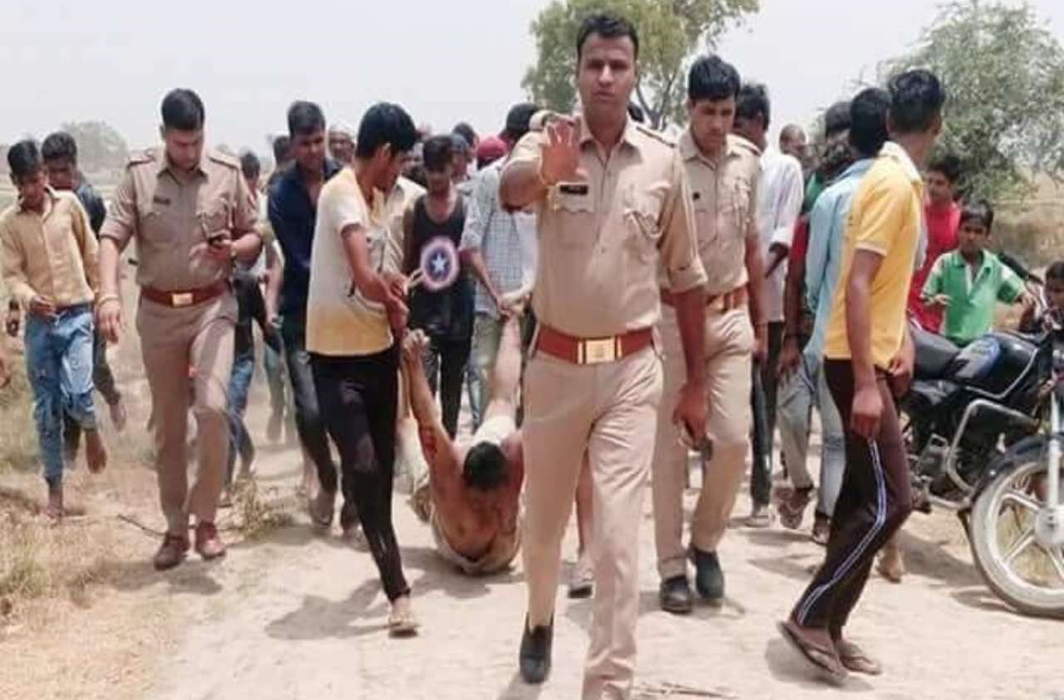
~By Saeed Naqvi
Two policemen leading the mob which ultimately lynched a Muslim in Hapur is, of course, part of familiar communalism which has to be revved upon to a higher pitch in order to prepare the ground for the General Elections in 2019. The animal to be protected is not the cow, but power.
For this ultimate goal, incidents like the one in Hapur and the more ghoulish ones before it, hundreds of them, are all essential to maintain conditions of edgy, combustible intolerance. Nothing else seems to be working. Why not continue playing the game one knows best?
An accumulation of such incidents, even their simultaneous eruption on a large scale, amplified by the media, can whip up majoritarianism wherever Muslims are visible and where the majoritarian current has not been weakened by caste polarization. This applies much more to what the British called the “cow belt” but which is more accurately described as the “Hindi belt” – UP, Bihar, Rajasthan, Madhya Pradesh plus Maharashtra and Gujarat.
Read More: BJP end alliance with PDP, CM Mehbooba Mufti resigns; BJP recommends Governor’s rule
The 2019 Kurukshetra has to be organized, mobilized, galvanized, whipped up (with the media in tow) only by anchoring communalism to a higher purpose. In other words, “nationalism” has to be invoked. Cow and Love Jihad cannot be given the elevation of nationalism. Mere communalism results in finger pointing at the state apparatus; nationalism justifies the deployment of this apparatus. Whether this deployment is for a national or the nationalist’s cause is open to question.
Cow and Love Jihad cannot be posited as harbingers of national danger. They are not issues endangering national security.
This is where the new turn in Kashmir comes in. Polarization on a massive scale is the electoral requirement now that 2019 looms. This polarization would have been implausible with the BJP in chummy proximity to the PDP’s Mehbooba Mufti in Kashmir.
By sliding away from Mehbooba in the state assembly, the BJP has turned its back on the Muslims of the valley, ofcourse. It has also, in effect, freed millions of Hindutva cadres across Bharat Varsha to blow conch shells heralding the great 2019 epic.
The tearing hurry in which the Partition of India was affected may have been one reason why our founding fathers were unable to visualize what we face today. Progressive intellectuals may dismiss The Guilty Men of India’s Partition by Ram Manohar Lohia and The Tragic Story of India’s Partition by the late H.V. Sheshadri, Gen. Secretary of the RSS until 2000. But would they dismiss with equal contempt Maulana Abul Kalam Azad’s India Wins Freedom, particularly the crucial 30 pages which were kept in the custody of the National Archives until 1988? The Maulana is worthy of being read again today.
By the act of Partition and the sleight of hand in Kashmir, India trapped itself into a triangle. This truth has to be continuously repeated because the Indian mind is in the drill to chant a mantra faster than it is to understand a shloka. The three sides of this triangle are actually three axes which are New Delhi-Kashmir; India-Pakistan; Hindu-Muslim. These three axes are, in effect, one comprehensive complex of issues. As in a geometrical theorem, the triangle has to be addressed as a whole. It cannot be sorted out axis by axis, one side after another.
Read More: A crack in the BJP-PDP coalition in J&K?
If Ram Madhav, the BJP’s point man for Kashmir, marches off to Srinagar with a carte blanche from the High Command to solve the problem at any cost, there is nothing he can achieve without bringing Pakistan into the bargain. Activation of these two axes will have an impact on the third, Hindu-Muslim axis. This would entail the communal temperature coming down considerably. Will that serve the electoral aims of the party in power in New Delhi?
Ofcourse, it will not, and here, to complicate matters, another triangle comes into play. Since the 80s and 90s the primary triangle has become entangled with a very durable caste triangle. The caste pyramid or triangle instead of being left to social forces, time and attrition to equalize at its own pace, was aggravated by the sudden eruption of caste politics in North India in the wake of the Mandal Commission. Communal politics is the upper caste strategy to manage the caste upheaval from below. The upper caste or the ruling class formations project Muslims and other minorities as the “other” to keep the Hindu flock together, the Pyramid in some state of repair. The lower castes, likewise, would like to co opt the Muslim as an enabler in their bid for power and equality.
The Hindu ruling class in its Hindutva Avatar is averse to vertical or horizontal fragmentation. A federal India, corresponding to its regional diversity is anathema to the votaries of Hindu Rashtra. The preservation of this unitary Bharat is an article of faith with those controlling the Delhi Durbar. To mobilize masses towards this end requires a constant harping on an external enemy in cahoots with the enemy within.
The enemy within can be manipulated along the two internal axes of the triangle: New Delhi-Kashmir and Hindu-Muslim. The India-Pakistan axis, essential to complete the triangle cannot be played according to New Delhi’s will alone. External stakeholders include China, Russia, Central Asia and the US. As Charlie Chaplin, having fallen into a drum, his feet and neck protruding in an awkward loop, takes his hat off in an attempted bow, and announces: “Ladies and gentlemen, we are stuck!”
2024 Lok Sabha Elections
Bollywood actor Neha Sharma campaigns for her father Ajit Sharma in Bhagalpur, Bihar
The Bollywood actor posted a video on her Instagram handle which showed her journey through various districts of Bihar, including Kishanganj, Banka, Purnea and Katihar. She was dressed in a traditional salwar kameez and was seen greeting and encouraging the public to cast their votes.
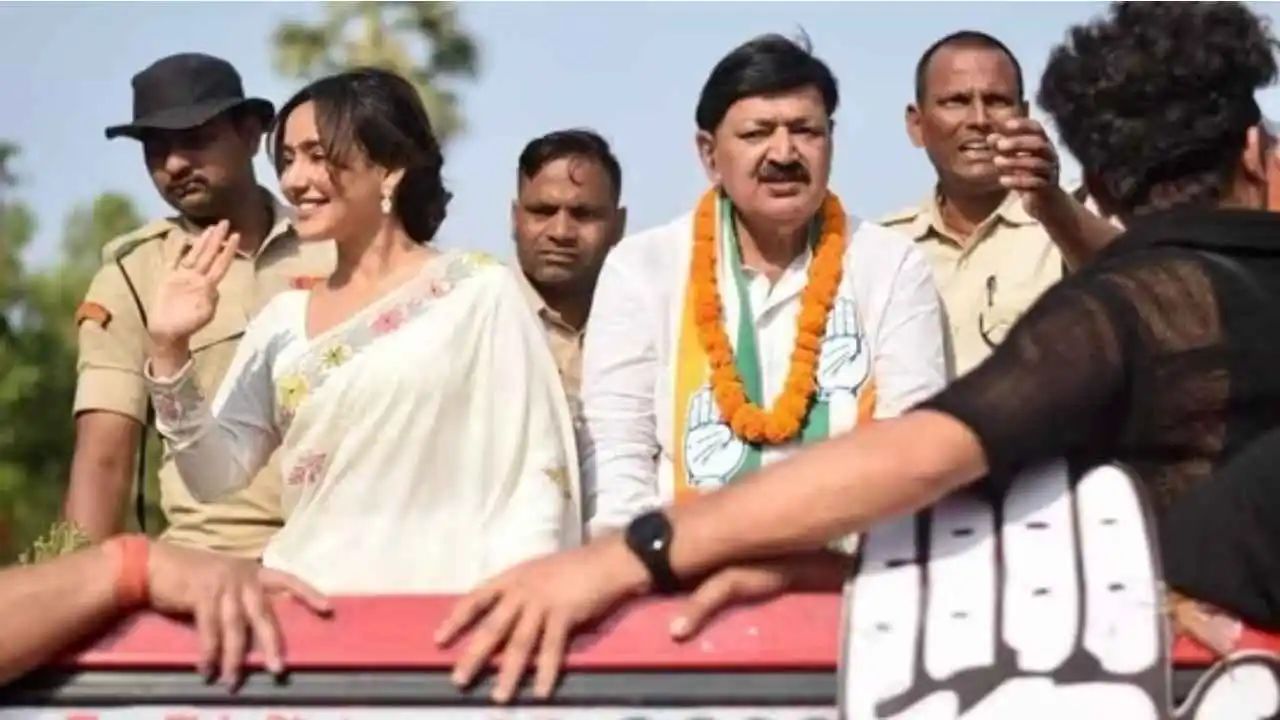
Bollywood actor Neha Sharma’s recent participation in a roadshow in Bihar has taken the internet by storm. Sharma, known for her roles in films like Tum Bin 2 and Crook, was seen supporting her father, Ajit Sharma, who is contesting from Bhagalpur Lok Sabha seat on a Congress ticket. The roadshow came amid speculations that the actor might enter politics. But, it is now clear that she was just campaigning for her father.
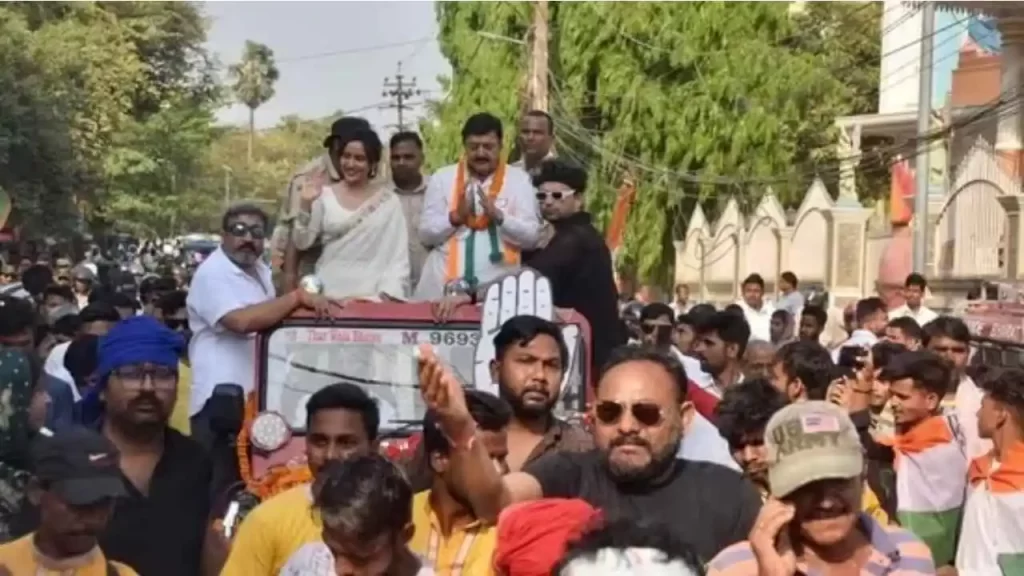
The Bollywood actor posted a video on her Instagram handle which showed her journey through various districts of Bihar, including Kishanganj, Banka, Purnea and Katihar. She was dressed in a traditional salwar kameez and was seen greeting and encouraging the public to cast their votes.
The actor received a warm reception and love from a large crowd in Pirpainti and Kahalgaon during her roadshow. She wrote on Instagram that it is said when someone gives one a place in their heart, then they live there forever. She said her heart is full of all the love and support she was receiving from the people. She thanked the people for the warm welcome she got in Pirpainti and Kahalgaon. Aapka pyar sar ankhon par.
Another video, circulating on social media showed the actor actively participating in her father’s election campaign in Bhagalpur. The election to the Bhagalpur Lok Sabha seat is set to take place in the 2nd phase on April 26. Ajit Sharma is representing the Congress and is up against JDU’s Ajay Kumar Mandal in this seat.
Earlier, there had been rumours and speculations that Neha Sharma might join politics. But many reports have clarified that she is not making her political debut yet. The Bollywood actor had been offered the opportunity to join politics by her father Ajjit Sharma but she is currently focusing on her acting career.
Education
Farmer’s son Nilkrishna Gajare Nirmalkumar from Maharashtra scores 100 NTA score in IIT-JEE Mains 2024
Nilkrishna Gajare’s father is a farmer and had to discontinue his own education after Class 12 as he faced financial difficulties. Gajare faced financial challenges growing up. However, his unwavering dedication and strategic approach to preparation set him apart from the crowd.
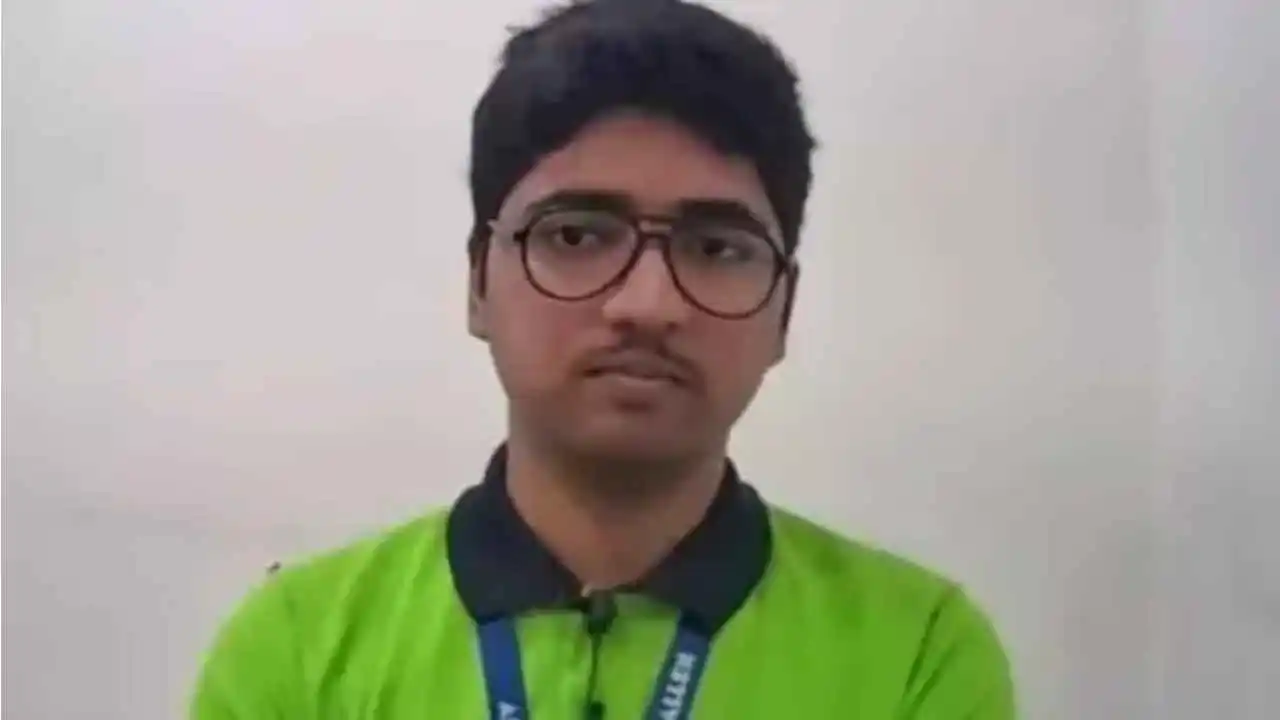
Nilkrishna Gajare, who hails from Maharashtra’s Washim, achieved an extraordinary feat by securing a perfect score of 100 in the JEE Main 2024 examination. His journey from humble beginnings to the pinnacle of success is a source of inspiration for many people.
Nilkrishna Gajare’s father is a farmer and had to discontinue his own education after Class 12 as he faced financial difficulties. Gajare faced financial challenges growing up. However, his unwavering dedication and strategic approach to preparation set him apart from the crowd, which resulted in his remarkable achievement of emerging as topper of one of India’s toughest Engineering entrance exams.
Nilkrishna Gajare had a strategic plan that helped him succeed in IIT-JEE 2024. According to Nilkrishna persistence is important and one should never stop trying until they understand a topic. He said being curious and asking questions are important traits of a good student. He said one should not be ashamed of asking questions.
Nilkrishna spent around 10-15 hours every day studying on his own for the JEE Main exam. He mentioned that he used his class notes for Physics and Physical Chemistry. For organic chemistry and inorganic chemistry, he relied on both notes and practice questions.
As for Mathematics, he believed that practicing regularly was the most important thing for him. Other interests of Nilkrishna include archery. He has participated at both state and national levels, and he finds joy in the sport. He said archery helps him understand the importance of focusing his attention on his goals. Nilkrishna likes watching movies and said they are a great source of enjoyment and relaxation.
He likes to watch a movie after exams and occasionally treats himself to one each week too. Gajare aims to keep up the pace for the JEE-Advanced exam and hopes to get into the IITs. He said he wants to secure admission in IIT-Bombay in the computer science branch.
2024 Lok Sabha Elections
Lok Sabha elections: Samajwadi Party chief Akhilesh Yadav files nomination from Kannauj
The Samajwadi Party has announced Akhilesh Yadav as its official candidate for the Kannauj Lok Sabha seat today
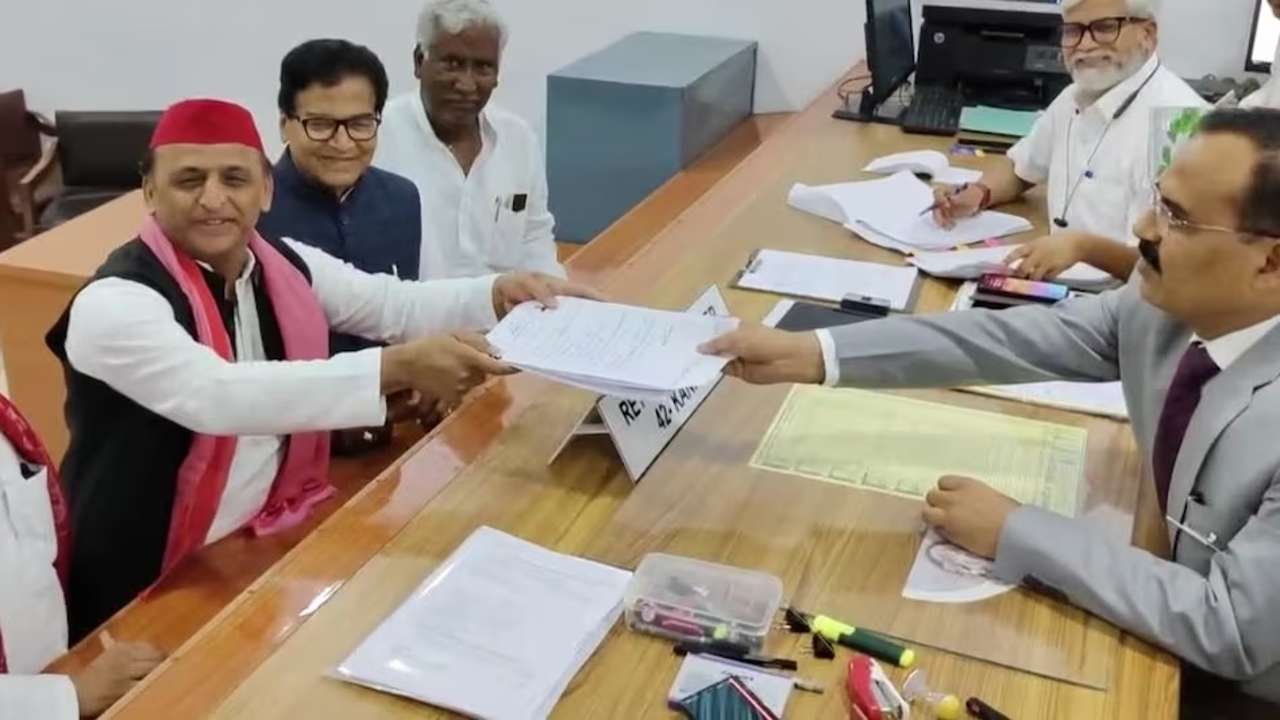
Samajwadi Party (SP) chief Akhilesh Yadav, submitted his nomination for the Kannauj Lok Sabha constituency ahead of tomorrow’s second round of voting. In front of Ram Gopal Yadav and other party leaders, the chief of the SP, who had previously contested the seat in 2000, 2004 and 2009, submitted the nomination.
Speaking with media, Ram Gopal Yadav said that SP would win the seat by a huge margin. The BJP candidate might lose his deposit in the seat, he said.
The Samajwadi Party has completely reversed its earlier plan to field former Mainpuri MP Tej Pratap Singh Yadav as their candidate, which is a significant political development.
Earlier, Akhilesh Yadav told reporters, people will find out when the nomination takes place, in reference to the speculations that he will contest for the seat. The historic victory of Kannauj is the subject of inquiry.
The former chief minister continued, the people have decided that the India bloc is coming as the future and the BJP will be history in this election.
Notably, elections for the Kannauj seat are scheduled for May 13, which would intensify the political drama that is now playing out in Uttar Pradesh. Previously regarded as the Samajwadi Party’s stronghold, the seat was lost by the party in the 2019 election when Subrat Pathak of the BJP won with a resounding victory.
The candidates competing for the following Uttar Pradesh seats will find out their destiny in the second round of voting, which is scheduled for tomorrow, Amroha, Meerut, Mathura, Baghpat, Aligarh, Ghaziabad, Gautam Buddh Nagar, and Bulandshahar.
Notably, two Bollywood celebrities running as BJP candidates in the second round are Hema Malini from Mathura and Arun Govil from Meerut. There are 91 contestants from UP competing in the second phase.
The seats in Gautam Buddha Nagar and Mathura are up for grabs, with a maximum of 15 applicants per seat. In Bulandshahr, six candidates are vying for the presidency. There are twelve contenders running in Amroha, eight in Meerut, seven in Baghpat, and fourteen in Ghaziabad and Aligarh.
1,67,77,198 votes will decide these candidates’ fates.
-

 India News22 hours ago
India News22 hours agoLandslide hits Arunachal Pradesh, highway linking Indo-China border affected
-

 Entertainment21 hours ago
Entertainment21 hours agoBollywood stars Salman Khan, Alia Bhatt, Rekha, Sonakshi Sinha, Aditi Rao Hydari attend Sanjay Leela Bhansali’s Heeramandi premiere
-

 Cricket news15 hours ago
Cricket news15 hours agoTelugu superstar Mahesh Babu meets SRH captain Pat Cummins, says it is an absolute honour
-
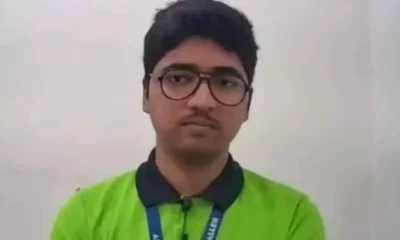
 Education20 hours ago
Education20 hours agoFarmer’s son Nilkrishna Gajare Nirmalkumar from Maharashtra scores 100 NTA score in IIT-JEE Mains 2024
-

 India News22 hours ago
India News22 hours agoTamannaah Bhatia summoned in illegal IPL streaming app case, to appear before cyber cell on April 29
-

 Cricket news22 hours ago
Cricket news22 hours agoIPL 2024: Rishabh Pant, Axar Patel score half centuries as Delhi Capitals beat Gujarat Titans by 4 runs
-
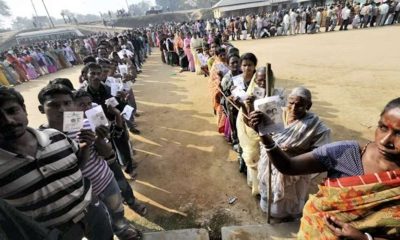
 2024 Lok Sabha Elections21 hours ago
2024 Lok Sabha Elections21 hours agoBihar: Election Commission extends voting timings for 4 Lok Sabha seats due to heatwave
-

 Entertainment18 hours ago
Entertainment18 hours agoAamir Khan to begin shooting in Delhi for Sitaare Zameen Par next month


